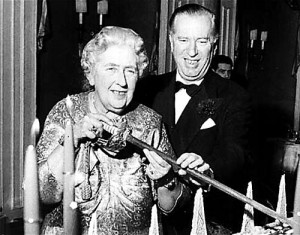How to break out of a Mousetrap
MURDER he said. Teeth clenched, eyes blazing, the preteen projected all the hate, (yes, hate) that one 12-year-old can muster towards another. The object of loathing was a fat classmate who had just committed a corpulent crime – a Crime against the Enjoyment of Art. The crime was serious, it was “murder” – murder of the Spoiler Category. Victims of such crime are those who have been looking forward to the frisson of a surprise ending to a gripping, artfully constructed story only to have the thrill ruined for them.
Here is the scene of the crime in question:

Cold Theatre 7 puts on Agatha Christie’s “The Mousetrap” – the world’s longest running stage play. Photo: Revon Fernandopulle and (inset)Passionate about theatre: Kevin Cruze, director, producer, actor. Photo: Anuk de Silva
In the shade of a siyambala tree, on the edge of the school grounds, one afternoon in 1963, two schoolboys are discussing crime fiction in general and in particular a stage thriller that is playing at a theatre around the corner. Just as the bell rings to mark the end of the lunch hour, the offender reveals the identity of The Killer in The Famous Thriller and walks away, quite pleased with himself, fat grin on fat face. The other schoolboy is to see the play that same evening. He can’t believe his ears, that his classmate should have done this to him, the wholly unforgivable.
It is one kind of crime to spoil the fun for anyone who enjoys a good detective story by unmasking the killer before time. It is a bigger crime when it’s an Agatha Christie, whose murder mysteries invariably end with a huge surprise. Imagine then the enormity of the wrong when it is committed against Agatha Christie’s most famous work, the stage thriller “The Mousetrap”, which has been running non-stop for 63 years simply because of its knockout shock ending.
“The Mousetrap” is the longest running play in theatre history. It is not an especially distinguished piece of theatre, and certainly not in the same league as Christie’s far superior “Witness for the Prosecution.” It is a creaky contraption, painfully dated and confined. What keeps it going is the denouement. At the close of each performance, the audience is requested not to spoil the ending for those who have yet to see the play.
That evening, 52 years ago, the wronged and dejected schoolboy headed to the Lionel Wendt Theatre, ticket in pocket and faint from the blow inflicted by the spoiler of the century. “The Mousetrap” was being done by the Colombo Amateur Drama Club (CADC), a band of long-term British residents nostalgic for the UK. All that week, expectation and excitement had been building up in the preteen’s heart.

Agatha Christie, with theatre impresario Peter Saunders, at “The Mousetrap” 10th anniversary party in London in 1962
For the duration of the play, two hours of sheer anticlimax, we told ourselves that the suffering we were enduring must be rather like what a prowling domestic rodent would feel on having its back snapped in two and its spirit killed in a rusty pest-exterminating device. Defeated. Flattened. Utterly crushed.
The play over, our grim-faced schoolboy went home vowing revenge. He lay in bed that night, his mind reviewing an assortment of murder methods deployed by detective story writers. His imagination put his fat-faced classmate through a series of excruciating, wholly lethal situations, each more satisfying than the last. Vengeance achieved, the 12-year-old fell into deep happy slumber.
In 1963, “The Mousetrap” was 11 years old, a little older than we were. A photograph of Agatha Christie holding a long sword, poised to cut through a cake weighing half a ton, at a 10th anniversary party to mark the play’s record run, had appeared in a newspaper the year before.
Fast-forward half a century.
“The Mousetrap” made a comeback recently, again at the Lionel Wendt Theatre, in a production by Cold Theatre 7, a group of enthusiastic young actors. We were in the audience, for old time’s sake and not for surprises.
The performance prompted many thoughts: about English language theatre in this country, as it is and as it was (from the ’60s through the ’80s); about audience expectations; about play choices, topicality and relevance. Also about anachronisms.
An anachronism is something that belongs toanother time, and that is how Cold Theatre 7’s “Mousetrap” struck this audience member: the play belongs elsewhere, not in today’s Colombo.
In fact, we recall having much the same thought 50 years ago. The CADC’s “Mousetrap” was as an anachronism even in 1963. It felt out of time, out of place. You could excuse the CADC, which was made up of expats who, like their peers in the companion International Theatre Group (ITG), played for their own amusement and that of the foreign community here, not really to a Ceylonese audience. A play like “The Mousetrap”, like a Noel Coward or a Gilbert and Sullivan vehicle, was a cosy reminder of home and things English, and if the natives of a former British protectorate could bring themselves to enjoy such fare, all the better.
Could not Cold Theatre 7 have done something different with the stuffily English “Mousetrap”? Tweaked the text, painted it in hot local colours, given it a contemporary tang? How much more fun for a Sri Lankan audience if a large English country house wrapped in snow and mystery were to make way for a “moosala” (gloomy and depressing) country walauwe, cut off from civilisation by monsoon rains and floods. The English characters could have been morphed. Mrs. Boyle, the murder victim, could have been transformed, say, into a Mrs. Rathulovigediya; Major Metcalf made a Major Haraksingho; Christopher Wren a Mr. Christy Maaligawa, and Detective Sergeant Trotter an Uurugoda Raalahamy.
Another sharp difference between the two “Mousetraps”, 50 years apart, was the age factor. The CADC “Mousetrap” was performed by mature amateurs who looked the age of the characters they played. Cold Theatre 7’s bright young things were nowhere near the ages they liked to be.
When we started going to the theatre, in the early ’60s, the credibility rule was to have full adults in full adult roles. Young adults were neither seen nor heard. Theatre then was largely serious adult entertainment – mature performers, mature performances. Even the comedies were serious adult undertakings. That generation of players is no more. What we have now is theatre largely in the hands of young enthusiasts. That is no bad thing, so long as their work rises above secondary school, campus-level entertainment.
Kevin Cruze, Cold Theatre 7 director and producer, likes mystery stories. Last year he gave us another Agatha Christie, “And Then There Were None.” (He says he can manage no more than one play a year, given his 10-hour work-day, at a leading finance operation.)
Why England, year after year? Instead of more English mysteries, how about a murder thriller set in trendy Colombo 7, or behind the columned colonial facades of the Fort, our former Central Business District?
Mr. Cruze is a creative, talented young man who can do wonders on the stage. A couple of years ago he took “The Comedy of Errors” and rejigged it to fit local comic conditions. “Lankawe Twins Kalabala” was a sweet nod to his beloved Shakespeare, and it was a hit. Mr. Cruze wrote the script, directed and produced, as well as played a lead character. With his good looks, charm and charisma, he should be more on stage than backstage.
Cruze, theatre freak that he is, took two years off his first job to go to England to study drama and acting. He couldn’t raise enough money, so he took a small job, saving in order to learn about theatre from seeing plays. Among his favourite theatre-going memories are those of Jude Law playing Hamlet and, for two pounds sterling a show, the cheapest of tickets, standing in front of the stage of the reconstructed Globe Theatre to see Shakespeare, as performed in Tudor times. He would stand in the rain under borrowed umbrellas, huddled together with the other groundlings. At St. Joseph’s College, Colombo, Cruze was a repeat participant in the annual Schools Shakespeare Drama Competition, acting in five performances, directing six, and helping his school win the Shakespeare Trophy on four occasions.
Kevin Cruze could have done a great adaptation job with “The Mousetrap,” as he did with “The Comedy of Errors.”
Another cavil: Must local theatre groups simulate English accents for an English play? Unless they grew up in Britain (or went to an international school run by native-English speakers), Sri Lankan actors are hard put to get an accent right, even when hamming it up.
Cold Theatre 7 has a nice-looking cast, one that seems to have recently graduated from university or diploma school, but their straining to sound English was a strain on the audience. Much of the dialogue failed to come through. (Some relief arrived when the least intelligible of the actors was bumped off halfway through the play. The strangling was in the script.)
Putting on a show such as “The Mousetrap” is not a piece of cheese-cake. Play production demands months of planning, rehearsing, and painstaking fund-raising. Cold Theatre 7 raised one and a half million rupees for their recent outing. Would it not have been more to the point to have poured those resources into something contemporary, easy-to-relate-to for a local audience, more substantial and satisfying than a soufflé out of an English grandma’s falling-apart recipe book?
“The Mousetrap” is lightweight. It is a tourist attraction that works for the West End of London. The trap has no place here.
The choices are infinite for our exuberant, adventurous drama enthusiasts.
Why not a commissioned play by a promising local playwright who could do with some exposure? Why not a well-crafted adaptation of a world theatre classic?
The crowd that comes to the Wendt is smart, alert, aware. They know about actors, acting, directing and artistic production values. They are culture savvy from hours spent watching and talking about movies, from border-crossing interaction, and travel. TV, DVDs and the Internet have put them in close touch with the greater entertainment world. Their standards are high.
It would seem that sections of local theatre need to break out of the mousetrap they have created for themselves – that of limited, narrow choices, and of material that may be relevant to New York and London audiences, but hardly here.
Let there be free-ranging diversity. There’s a bigger picture to consider: World Theatre.
As for our smiling Form One friend, we have no other memory of him than of how he looked that afternoon in ’63. We must have crossed paths often over the next six years, in our parallel school lives in parallel language stream classes.
It is only the smiling face we recall.


